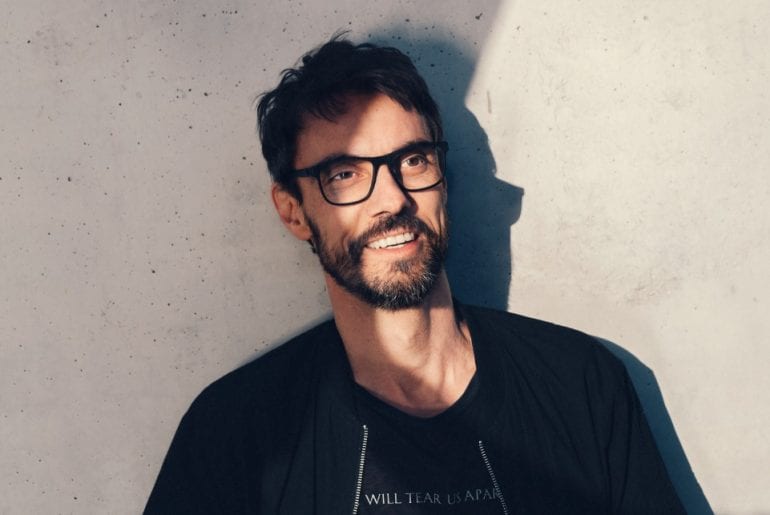Over the quarter-century that he’s been making music as an artist and curating it as a label owner, Germany’s Steve Bug has been adept at riding the waves of evolving dancefloor tastes while maintaining his artistic vision.
The Berlin-based DJ/producer (born Stefan Brügesch) has founded labels like Poker Flat, Raw Elements, Dessous, Audiomatique and, most recently, Sublease Music. In addition to introducing unique talents like Trentemøller to the world, his Poker Flat label brought us seminal tracks like Argy’s 2005 acid fave, “Love Dose,” among many others.
His artistic output has deftly pushed elements of house, acid and techno. Bug tracks like 1999’s much-remixed, minimal classic “Loverboy” and mix-comp series like Da Minimal Funk (Raw Elements) and Bugnology (Poker Flat) pushed the minimal movement to new audiences. The latest comp, Best of Poker Flat 2020, delivers highlights from the label’s deep stable, which includes Bug, Tim Engelhardt, Langenberg, Martin Landsky and more.
Bug celebrated Poker Flat’s 20th anniversary in 2019, but, as we all know, 2020 has been another matter. Nonetheless, with Bug being such a pro-active sort, he turned this period of dramatic isolation into a time where he could stretch out creatively. Never Ending Winding Roads, a full-length artist album on Poker Flat, is the result.
In a way, the album serves as a bit of an electronic soundtrack for the whole pandemic experience. The emotional ebb and flow certainly reflects what many people have gone thru these past few months – torrents of anxiety and dread, followed by glimmers of hope and, ultimately, rays of optimism.
Initially, the album takes a somewhat foreboding posture. Trippy opener, “Ludic Loops” bristles with anxiety, then gives way to the hypnotic “A Conscious Machine,” whose breakbeat underpins an irresistible, yet edgy synth line. “Electro Harmonix” maintains a nervy vibe and, as the title suggests, “The Clock Is Ticking” spouts full-on existential dread in seven-plus minutes of tension-filled, minimal techno.
But then the full-length takes a turn. Sci-fi-flavored “The Awakening” bubbles with promise, while “Yellow Snake” hints at resolution. “Confidence Dub” bursts into a moody dancefloor mover, then “Raindance 101” and closer “Upon Mountains” provide welcome and optimistic relief. It’s quite a ride.
As this brutal year drew to a close, we caught up with the Berlin-based DJ/producer to discuss the album, his process, his outlook on the DJ/music scene and more.
DJ Times: When you began your musical journey, what were your principal inspirations?
Bug: I was infected with the house and techno virus after my first visit at The Front club in Hamburg in 1987-88. I immediately fell in love with the music, the vibe, and the fact that the music never stopped. Before, there were mostly breaks between every other record in most clubs. After my first visit, I started buying records. Later that year, I bought a second turntable and a mixer. For three or four years, I’d been mixing at home, making tapes for my friends, until I finally started my own parties at the club that I was bartending at the time. That was – besides a very first gig in a small afterhours bar in Ibiza – where it all started.
DJ Times: How have your personal tastes and approach to music evolved in recent years?
Bug: I think I might have learned to appreciate the original roots of house and techno even more than ever. They have been in my blood from the beginning; but at the moment, I feel a stronger connection to these roots again. I’m not saying that there is no good music from the recent months, but even the stuff that I personally really like has these strong roots from the early days. When I’m in the studio and when I turn on the gear, I never know where I want to go musically. Things just happen naturally. So I end up with what’s coming out of me, and/or the machines.
DJ Times: What were your day-to-day activities during the initial lockdown?
Bug: I’m living in Berlin, and like in most places, pretty much everything was on lockdown – but still allowed to go to work, to the supermarket, to the doctor, or to the pharmacy. Also, taking a walk with the family or one other person, keeping the distance of two meters was allowed. As well as going for a jog, or something similar by yourself, was allowed. I was staying home most of the time, only going out for the necessary. I was spending much time in the studio, working on new music, or just jamming around. But that’s something I’d usually do as well.
DJ Times: Were you feeling cooped up, with lack of exercise, maybe?
Bug: I try to stay fit, which wasn’t easy, because I usually go bouldering three times a week, and there is nothing similar that you can do at home. But I found a good training app. I definitely played more video games. And home cooking, obviously, became necessary as well – but I enjoy it.
DJ Times: Was your reaction to the pandemic, in any way, useful for your music and productions?
Bug: In the first weeks, it felt like a big holiday. Not having to tour, and not having anything to take care of that comes with ahead of a touring schedule, I had won some extra time that I used to be in the studio. I wrote so many new tracks, that I decided to come up with an album.
DJ Times: Why an artist album now? What was your approach, in terms of theme or inspiration?
Bug: Is there ever a good time for an artist album nowadays? I think, if you’re writing a ton of tracks that go very well together, it definitely makes sense to release them as an album, instead as a bunch of single releases. To me all these tracks on Never Ending Winding Roads kinda belong together. It’s a musical journey that, for me, works great in a listening environment, as well as in a club. Due to the won time, I had the change to dig even deeper into my personal likings. Not having the dancefloor in mind, in the first place, helped me to write something more personal.
DJ Times: How so?
Bug: My mindset was just completely different from any other project I have embarked on. I didn’t have to tour, and instead could focus 100-percent on writing music without having the dancefloor as a constant influence. This allowed me creative freedom to explore a range of styles and emotions, and as a result, it is the album I feel most satisfied with to date.
DJ Times: In the studio, what’s your set-up?
Bug: I have an Allen & Heath GL4800 mixing desk and I work with [Apple] Logic Pro X [DAW]. I was about to switch because Logic was so behind, but they finally made some big moves, and now I truly love it again. I use pretty much all of the synths of the Arturia V collection, as well as some stuff from Native Instruments. For the drums, I often use the Logic Sampler – it finally has some great features that were missing before. On top of that, I have a lot of hardware. I’ve been collecting all sorts over the years, but since I am moving into a smaller studio, I shrinking down the collection to what I really think I need.
DJ Times: Are there “secret studio weapons” that help create your favorite sounds?
Bug: One of my favorite synths is the Studio Electronics Omega 8. We used it on pretty much every track on the album I did with Langenberg [2018’s Paradise Sold on Poker Flat]. It is such a great-sounding, versatile synth, I wouldn’t want to miss it. But I just bought the Sequential Prophet-5 Rev4, an updated version of the original Prophet-5 with the original chips, and the option to switch between the chips of the Rev1 and 2 or the Rev3. It is a beast, very simply, but a very effective weapon for what I am into. I had one in ’94, but it was in a really bad shape, so I had to give up on it at some point. So damn happy it’s back now. And I can’t forget the Minimoog Model D. I bought it when they re-issued it, and it simply suites me very well.
DJ Times: What’s your DJ set-up and why do you choose that route?
Bug: I play on [Native Instruments] Traktor with Control Vinyl, simply because I still like to touch the vinyl, put the needle on, etc. But I don’t want to carry all those records around anymore. Also I like the extra opportunities that come with playing digitally – having various effects at hand, for example. So, for me, this is still the perfect pairing of the two worlds.
DJ Times: What kind of live-streaming have you done during this time?
Bug: I did a live-stream for a good cause for a promoter in Chile. I recorded it at Noisy Rooms [rehearsal space] in Berlin. It was actually fun playing records out loud. I had a friend helping me with the video-taping – he was there dancing with me, which made it even more fun. But I don’t think it’s something I am keen on doing on a regular basis. It is missing the crowd factor, though. Also, it was a bit inflationary at the beginning of the first lockdown. I personally prefer audio mixes, as I don’t need to look at a DJ to enjoy myself listening/dancing to music. I mean, seriously, how many people watch a whole live-streaming from the beginning to the end? Most of all the clicks that you’re seeing have probably joined in for a few minutes and then turned it off again.
DJ Times: How do you see the DJ/electronic-music scene changing in 2021? How will DJs and events adapt?
Bug: To be honest, I’m not sure if clubs/festivals will be able to re-open next year after all what’s going on in the world right now. Politicians all over the world are somehow blaming the nightlife for the infection process, even though in most countries the nightlife hasn’t been happening since March. It seems like we are the ulcer one would like to get rid of. So many people from the nightlife and everything that comes with it are struggling. So little is done to help people get through these times. And thinking of the clubs, whose financial support has been cancelled… Only time will show how many will survive this period. We will have to wait to find out how big the damage on the entertainment industry really is in the end. I truly hope for the best.
DJ Times: What income-producing work did you lose during this time?
Bug: I lost all gigs going back to March so far, including a nice tour in North and South America, a beautiful festival in the Swiss mountains, and many other gigs. Besides that, I had a “Steve Bug Presents Play” party lined up here in Berlin at Ipse. So, basically, like many other DJs, I have no gig income since March. Producing your own music and releasing it became more of a business card to get booked, since there is almost no money to make anymore.
DJ Times: One problem ends up creating another…
Bug: Like many others, I do have a proper studio that needs maintenance, and I have to pay the rent for it. This comes mostly out of the touring money. I really think that this crisis will affect our business for a rather long time – no one knows for how long we won’t be able to party together again. Many countries have closed their borders for several months. Festivals may not happen this summer. Many clubs may not survive the shutdown. So there is going to be even more DJs fighting over less club gigs in the future. It will take time to grow into something new.
DJ Times: During this weird period, are you doing anything new or different that’s ultimately constructive to your music life/career?
Bug: I’ve been DJing, writing my own music, and running a label for almost 30 years – and that’s what I am good at, and what I love the most. Of course, there are alternative jobs/options in the music biz, but I prefer to leave these to those who are better at it. So apart from not touring, I am basically doing the same as before. I’m in the studio as much as possible, writing new music, actually a few more collaborations – obviously by sending parts to each other via the web – are planned, since everybody has more time in the studio these days. I’m also working on the two labels, Poker Flat and Sublease Music, and I’m checking out the new releases every week. With the extra time given, I’m checking out more downtempo, chill-out stuff. That may influence the upcoming productions.
DJ Times: What’s the most surprising thing you’ve realized during this period of social distancing?
Bug: How little problem I have with it, and how big of an issue it is for others. I mean, I love connecting with the crowds when I play, and I truly miss that right now. But when I am touring, I feel sometimes more alone, being close to strangers – on flights, or at airports, for example – than I feel right now. Being alone is a part of the job, if you’re not traveling with a tour manager. You’re also alone in the studio, sometimes for days – we’re used to it.
DJ Times: What’s next for you, creatively?
Bug: Now that the album’s out, there’s another collaboration [“Flying Keys” b/w “Silver Star Stallone”] with my mate Clé on Rejected. By end of the year, I will be moving the studio, and hopefully the new one will be up and running after a short time, so that I can go back to work on more music.
DJ Times: Any advice on staying sane and relatively positive through this situation?
Bug: Keep your sense of humor, learn something new, do some sports, stay in touch with your friends and family, catch some fresh air and sun, if you can. Basically, keep yourself entertained – this includes learning about yourself.
To check out more interviews, click here.







